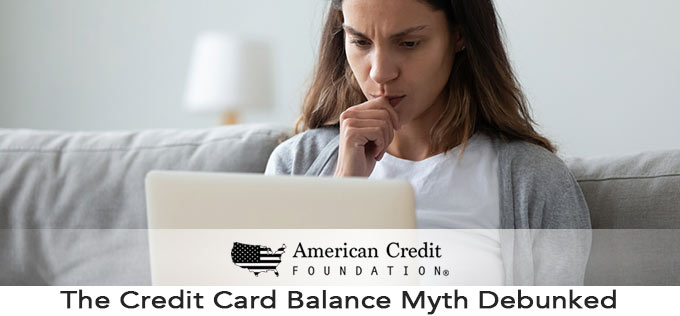
Whether you’re trying to build or repair your credit, you’ve likely heard that carrying a credit card balance will improve your credit history. Unfortunately, there’s just no truth to this. Come along as we bust this common myth and give you some better alternatives.
Should You Carry a Credit Card Balance?
On its face, it seems that carrying a credit card balance and making the payments on time every month would help improve your credit score. But when you dive deeper into the topic, it quickly becomes apparent that this myth can hurt your credit score in the long run.
Here are three reasons why carrying credit card balances could hurt you.
- It Affects Your Utilization Rate
The first thing to know is that a large portion of your credit score (30%) is made up of credit utilization. That is the amount of credit you use in comparison to how much available credit you have. If you have a $10,000 limit on a credit card and carry a balance of $4,000, that means you use 40% of your available credit. Most lenders get concerned by utilization rates above 30%. People with excellent credit scores typically keep their utilization rates below 10%.
And those figures aren’t calculated on your total available credit, making it even more important to pay attention to your balances. Say, for instance, you have four credit cards that give you a total of $10,000 in credit ($2,500 each). If you carry a $2,500 balance on one of them and no balances on the other three, it will still hurt your credit. That’s because even though your overall credit utilization would be less than 30%, your utilization on the card you use is 100% – and lenders will pay attention to that.
- You Will Pay More Than You Borrowed
Another reason why you should think twice about carrying a credit card balance is the interest you will pay. Remember, most credit card interest rates start at 17% and go up from there. If you have a balance of $10,000 on your card and only make the minimum payments, you will pay an additional $5,146.68 in interest – and it will take you six + years to do it!
- You Might Dig a Hole You Can’t Get Out Of
The last reason for not carrying credit card debt is that it’s too easy to fall into the habit of charging things when you don’t have the money to pay for them. Pretty soon, the little balance you carried in the hopes of improving your credit score balloons out of control, and you find yourself unable to make even the minimum payments.
Is There a Better Alternative?
The myth about carrying a balance on a credit card likely emerged from this truth: If you use your card and pay off the balance every month, it will help you build and restore your credit. For instance, if you use your credit card for groceries every month and then pay it off at the end of the month, it will help build or improve your credit score. What’s more, paying off your balance every month allows you to avoid the high-interest rates that come with carrying credit card balances.
What If You Can’t Pay Off Your Credit Card Every Month?
Not everyone has reached the point where they can afford to pay off their credit card balance every month. If you find yourself in that situation, the best thing to do is create a plan that will help you eliminate the debt. Here are four options when it comes to credit card debt:
- Use the debt avalanche method. After you make the minimum payments on all of your credit cards each month, put a little extra money toward the credit card with the highest interest rate. Once you pay that card off, do the same thing with the next highest interest rate card. By paying off the highest rate credit cards first, it will create an “avalanche” that will help you crush your debt.
- Use the snowball method. If you have a difficult time staying motivated while paying off debt, the snowball method gives you lots of “wins” along the way. To do it, pay the minimum payment on all of your credit cards, and put a little extra toward the card with the lowest balance. While using this method will likely cause you to pay more interest, every time you pay off one card, it will motivate you to begin making extra payments on the card with the next lowest balance.

- Use debt consolidation. If you have good credit, you can consolidate your existing debt so that you only have one payment with a lower interest rate. You can do this by opening a new credit card account with a 0% APR and transferring all the credit card balances to it. Or you can take out a personal loan with a low interest rate and use it to pay off all the credit cards. Just be sure to put your credit cards away, so you’re not tempted to start using them again. (Remember, don’t cancel them because that will lower your available credit and negatively affect your score.)
- Speak with an expert: Sometimes credit card debt can be overwhelming, and when that happens it’s best to speak with an experienced professional at a credit counseling center who understands your pain and can talk to you about ways to get your financial life in order.
Now that we’ve busted the myth that carrying a credit card balance is good for your credit score, what is your next move? Will you consolidate your debt, pay off your cards in full every month, or do you need to speak with someone to develop a plan of action that fits your individual needs? The experienced team members at American Credit Foundation are available to speak to you about the things you can do to get your credit – and your financial life – back on track.